Results
-
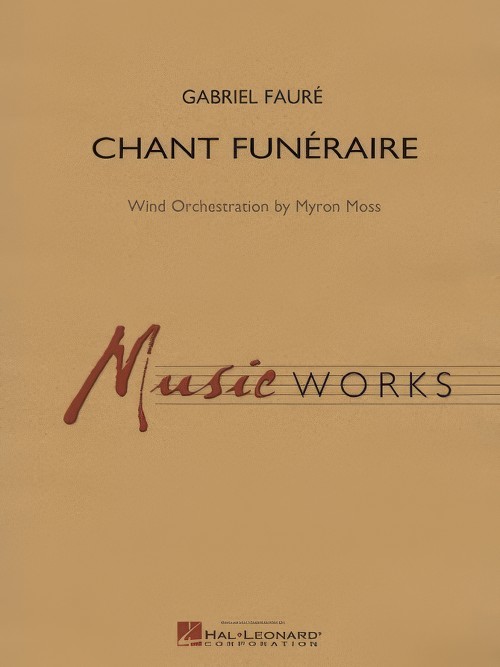 £79.99
£79.99Chant Funeraire (Concert Band - Score and Parts) - Faure, Gabriel - Moss, John
This hauntingly beautiful piece by Faure was commissioned by the French government in 1921 as a memorial for the centenary of Napoleon's death. It has been magnificently orchestrated for wind band by Myron Moss, and is already garnering national attention with several important performances including The Midwest Clinic in Chicago, December 2003. Expansive and rich-sounding, this piece demands a mature group but delivers an impressive and rewarding musical experience.Duration: 7:30
Estimated dispatch 7-14 working days
-
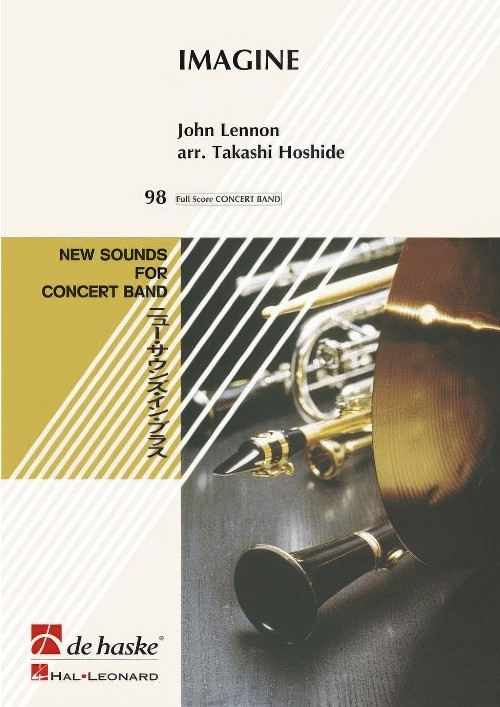 £110.99
£110.99Imagine (Concert Band - Score and Parts) - Lennon, John - Hoshide, Takashi
John Lennon's career was far from over when in April 1970, following the recording of the album Let It Be, the Beatles split up. This musically gifted and creative composer of many Beatles songs had a number of solo hits before he was tragically killed in 1980. Imagine was one of John Lennon's best songs and it remained in the charts long after his death. It is still not forgotten and is now thought of as a true pop classic. Takashi Hoshide has produced this attractive arrangement for concert band. Duration: 4.15
Estimated dispatch 7-14 working days
-
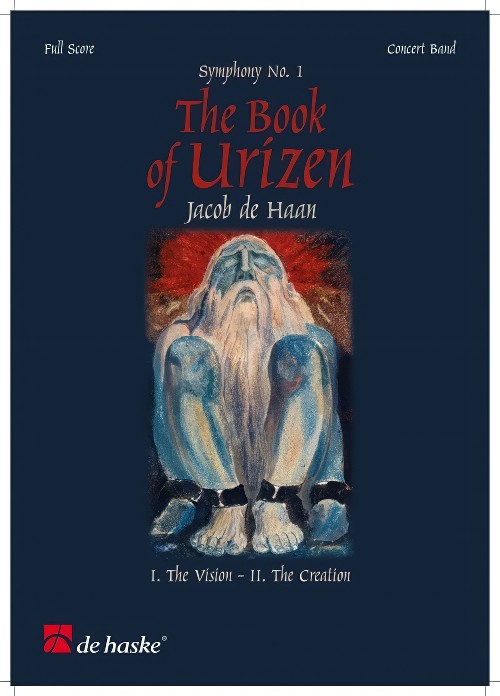 £421.99
£421.99The Book of Urizen (Movements I: The Vision and II: The Creation) (Soprano, Narrator and Concert Band - Score and Parts) - De Haan, Jacob
The Book of Urizen is a work for concert band, solo soprano, and a male narrator in which sound collages of religious expressions are used. The piece is inspired by the compelling visionary poem of the same name (which the poet illustrated himself) by the Englishman William Blake (1757-1827), who occupies a unique position in western literature and the visual arts. He was not just a poet and a writer, but he was also a graphic artist, a painter, an illustrator, a spiritualist, a religious visionary, and a mystic philosopher. For the performance of this work, a professional sound system, including two microphones and a CD player, is needed. The three sound collages are three separate tracks on the enclosed CD and can be played easily at the right moment.The Book of Urizen bears resemblance to Genesis and Exodus, of which the contents form the basis of the Christian, Jewish, and Islamic faith. Blake adhered to the principle that all religions are in fact one, and that deities reside in human beings. In The Book of Urizen this is represented in "The Net of Religion," which is spanned over the earth by Urizen. The sound collages, compiled by Jacob de Haan in the studio, find their origin in Jerusalem, the Holy City, where the afore-mentioned faiths come together.In the first movement of this composition, The Vision, Urizen prepares his vision of the world, and he presents this to the "Eternals." His vision is rejected, and Urizen locks himself up in his own abstract world. When he does emerge again, he is confronted with rage by the gathered Eternals. Urizen flees the wrath of the Eternals, "the flames of eternal fury," and enwombs himself in his own world. When the Eternals see Urizen in his "stony sleep," they wonder if this is death. The blacksmith Los is torn by grief because of the isolation of Urizen. It brings him to rouse his fires, prepare his forge, and to give Urizen's world concrete form.In the second movement, The Creation, Urizen's world, but also man, woman, and child are created. Los is horrified with the appearance of Urizen's body. He mourns and pities Urizen, and from his blood a female form comes into being, with the name Enitharmon. The Eternals, fearful of the female form, decide to erect a tent to obstruct their view to eternity. Enitharmon and Los beget a son, called Orc. Los baptizes him as a child of the "fallen world." Orc is fed at Enitharmon's breast, which makes a girdle of jealousy restrict Los' chest. He takes the child to the top of the mountain and chains him down. The cries of Orc awaken Urizen, who explores his world creating instruments of scientific measurement to do so. Los encircles the face of Enitharmon from the sight of Urizen and Orc. She then populates the earth by giving birth to an enormous race.The Web, the third movement of The Book of Urizen, is available in a separate set.
Estimated dispatch 7-14 working days
-
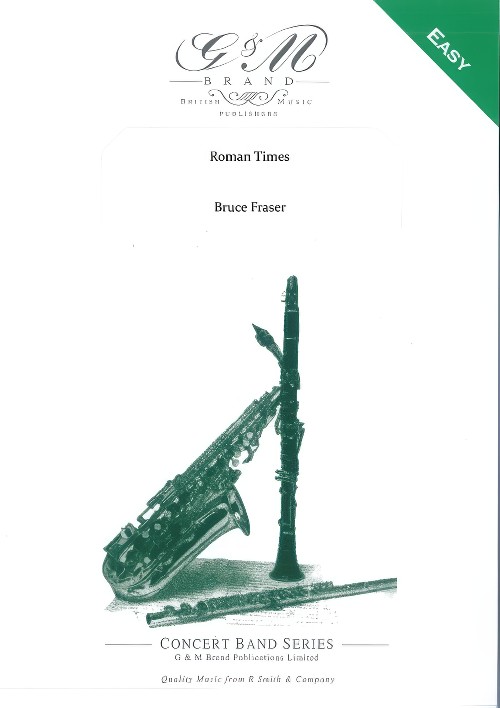 £74.95
£74.95Roman Times (Concert Band - Score and Parts) - Fraser, Bruce
During a visit to the town of Saintes in South West France in the summer of 2003, I spent some time in the Roman amphitheatre there. It is a well preserved arena and I imagined what it must have been like to take part in the gladiatorial games. 'Roman times' is based on these images with the opening grand procession and its amazing mixture of Mediterranean peoples. The middle movement is an old fashioned love ballad followed by gladiators fighting in a very spirited battle to death or victory.
Estimated dispatch 7-14 working days
-
 £14.95
£14.95Roman Times (Concert Band - Score Only) - Fraser, Bruce
During a visit to the town of Saintes in South West France in the summer of 2003, I spent some time in the Roman amphitheatre there. It is a well preserved arena and I imagined what it must have been like to take part in the gladiatorial games. 'Roman times' is based on these images with the opening grand procession and its amazing mixture of Mediterranean peoples. The middle movement is an old fashioned love ballad followed by gladiators fighting in a very spirited battle to death or victory.
Estimated dispatch 7-14 working days
-
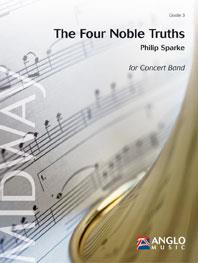 £168.50
£168.50The Four Noble Truths (Concert Band - Score and Parts) - Sparke, Philip
The Four Noble Truths are the most basic expression of the teaching of Buddha and therefore still form the guidelines for Buddhists to this day. The four truths are Dukkha, which describes times of major stress in our lives - birth, ageing, desire and death; Samudaya which describes those parts of our life that induce stress, feeling, craving, desire; Nirodha which tells us how to eliminate those aspects of our lives which induce stress and Magga which describes the eight disciplines which can help us eliminate the origins of stress from our lives. It can be seen from these over-simplified definitions, that the Four Noble Truths fall into two pairs, the first two describing the origins of stress and the second two describing how we can reduce stress. To reflect this, the four movements of this work are also combined into two pairs - two quick movements and two slow movements. A fascinating work from this great English composer.Duration: 14:00
Estimated dispatch 7-14 working days
-
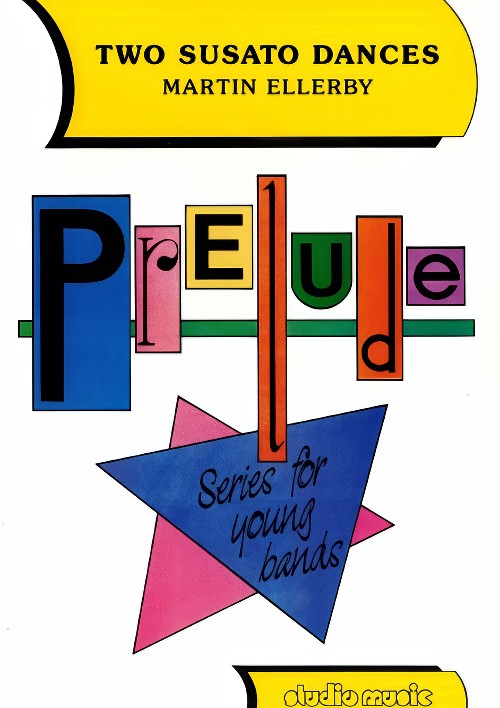 £44.95
£44.95Two Susato Dances (Concert Band - Score and Parts) - Susato, Tielman - Ellerby, Martin
Around 1540 Tielman Susato, the Belgium trumpet player and composer, established himself in Antwerp as a printer of music. In 1551 he brought out The Third Little Music Book, a collection of instrumental dances. Most of these are arrangements, possible by Susato himself, of popular dance tunes. In keeping with sixteenth-century practice, this book details no specific instrumentation; something to be worked out by the players with whatever available means. Doubtless many of the dances were performed on wind instruments at festive outdoor events. The date of Susato's birth is unknown but estimated to be around 1500. The same applied to his death, which is thought to be somewhere between 1561-64.The third Little Music Book gives several examples of the traditional sixteenth-century genre, the dance pair, a predecessor of the Baroque suite. In such a pair the first dance was often in slow or moderate duple time, the second in quick triple time. This is the case in the pair presented here, which consists of a lively round dance followed by a Hop Up or saltarello.Titles in the Prelude Series are specifically scored for bands with few, if any, bass instruments but will sound well on larger ensembles. The bass line is playable by any combination of bass clarinet, bassoon, baritone saxophone, trombone, euphonium or tuba; in the event that none of these is available, the part for trombone/euphonium (B flat TC) can be played by tenor saxophone. The tuned percussion part is entirely optional and can be played by any available instrument(s). Each piece also includes a preliminary exercise. This is always in the same key as the accompanying piece and consists of a scale and chord progression that can be used for improving ensemble, balance, intonation and instrumental facility by changing tempo, articulation and dynamics.Duration: 2.00
Estimated dispatch 7-14 working days
-
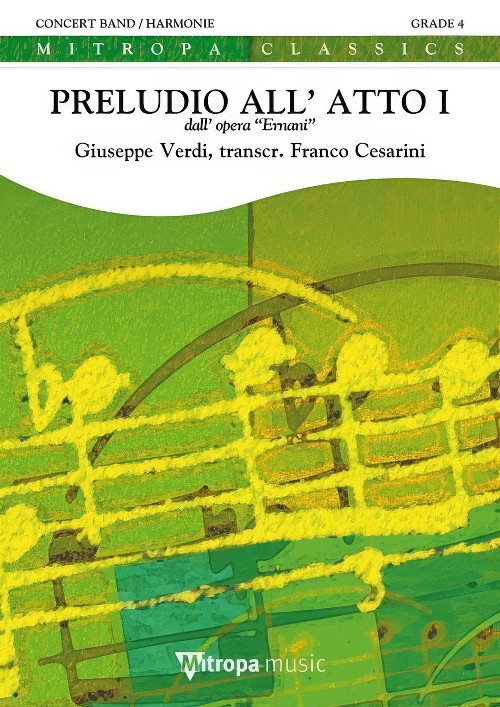 £89.99
£89.99Preludio All' Atto I (Concert Band - Score and Parts) - Verdi, Giuseppe - Cesarini, Franco
Ernani (1844), Giuseppe Verdi's fifth opera, is based on the homonymous tragedy by Victor Hugo. Verdi's success with Ernani, as well as Nabucco and I lombardi alla prima crociata, can be ascribed to two distinct ideas: the melodic idea and the patriotic idea. The melodic idea is very important to move and touch the audience, while the patriotic idea is the source of enthusiasm and emotions. Approximately ten years elapse between two similar stories: the one of the outlaw Ernani and the one of Manrico, the troubadour. In the prelude to Act I, in only three minutes, Verdi has succeeded in skilfully concentrating the main elements of the entire drama. One can clearly observe the themes of love, oath, and death.Duration: 3:00
Estimated dispatch 7-14 working days
-
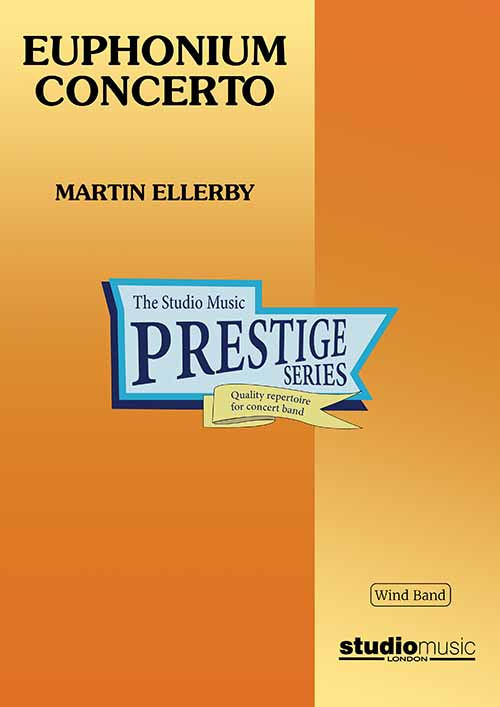 £164.95
£164.95Euphonium Concerto (Concert Band - Score and Parts) - Ellerby, Martin
This Euphonium Concerto was written between late 1994 and early 1995 in response to a commission from Steven Mead to whom the work is dedicated. It is cast in four movements and lasts a little over 22 mins:I. Fantasy: After the briefest of introductions, the solo euphonium enters with the key melodic phrase of the movement in a fast 'Tempo I'. This idea is developed up to the point where a slower 'Tempo II' breaks the argument - here the mood is reflective but it is only to be a brief interruption as 'Tempo I' returns very quickly. The opening material is then subjected to further transformation with 'Tempo II' making occasional returns en route, the distances between the contrasting tempi becoming ever closer, and the movement closes in a rather soft though definite manner.II. Capriccio: This relatively short presto movement forms a bridge between the first movement and the work's slow movement. The majority of the band parts are bright and muted with the percussion players enhancing the texture with contributions from xylophone, glockenspiel and vibraphone. Again the initial solo euphonium phrase provides the basis for almost all the movement's material. This is extremely virtuosic for the soloist and band alike and makes great play of the rhythmic possibilities of combining simple and compound music either in close proximity or together.III. Rhapsody (for Luis): A Lento movement, sitting between two different but essentially rapid ones, this provides the work's emotional core exploiting the soloist's cantabile qualities in an almost seamless fashion. Again, as will all the work's movements, the initial idea paves the way for subsequent development, eventually culminating in a passionate climax; thereafter it winds down with an affectionate backward glance towards the close of the the slow movement of the Euphonium Concerto of Joseph Horovitz, whose mark had been made indelibly on the euphonium repertoire. This movement is dedicated to Luis Maldonado who set the full score of the brass version before his untimely death.IV. Diversions: The work's variation finale is cast in 3/4 throughout though the barline is often a guideline and was seen by the composer as a challenge of metrical restraint! There is an obvious jazz feel to this movement (both rhythmically and harmonically) with a swaggering ritornello theme first announced by the solo euphonium. Thereafter follows a series of interludes and 'adjusted' returns of the main theme. A lyrical idea is allowed to enter but the underlying momentum is ever present. The band also contributes to the interludes and eventually the tempo increases towards a 'wild' and absolute conclusion.Duration: 22.30Recorded on QPRM143D Dreamscapes, Royal Northern College of Music Wind Orchestra
Estimated dispatch 7-14 working days
-
 £32.95
£32.95Euphonium Concerto (Concert Band - Score only) - Ellerby, Martin
This Euphonium Concerto was written between late 1994 and early 1995 in response to a commission from Steven Mead to whom the work is dedicated. It is cast in four movements and lasts a little over 22 mins:I. Fantasy: After the briefest of introductions, the solo euphonium enters with the key melodic phrase of the movement in a fast 'Tempo I'. This idea is developed up to the point where a slower 'Tempo II' breaks the argument - here the mood is reflective but it is only to be a brief interruption as 'Tempo I' returns very quickly. The opening material is then subjected to further transformation with 'Tempo II' making occasional returns en route, the distances between the contrasting tempi becoming ever closer, and the movement closes in a rather soft though definite manner.II. Capriccio: This relatively short presto movement forms a bridge between the first movement and the work's slow movement. The majority of the band parts are bright and muted with the percussion players enhancing the texture with contributions from xylophone, glockenspiel and vibraphone. Again the initial solo euphonium phrase provides the basis for almost all the movement's material. This is extremely virtuosic for the soloist and band alike and makes great play of the rhythmic possibilities of combining simple and compound music either in close proximity or together.III. Rhapsody (for Luis): A Lento movement, sitting between two different but essentially rapid ones, this provides the work's emotional core exploiting the soloist's cantabile qualities in an almost seamless fashion. Again, as will all the work's movements, the initial idea paves the way for subsequent development, eventually culminating in a passionate climax; thereafter it winds down with an affectionate backward glance towards the close of the the slow movement of the Euphonium Concerto of Joseph Horovitz, whose mark had been made indelibly on the euphonium repertoire. This movement is dedicated to Luis Maldonado who set the full score of the brass version before his untimely death.IV. Diversions: The work's variation finale is cast in 3/4 throughout though the barline is often a guideline and was seen by the composer as a challenge of metrical restraint! There is an obvious jazz feel to this movement (both rhythmically and harmonically) with a swaggering ritornello theme first announced by the solo euphonium. Thereafter follows a series of interludes and 'adjusted' returns of the main theme. A lyrical idea is allowed to enter but the underlying momentum is ever present. The band also contributes to the interludes and eventually the tempo increases towards a 'wild' and absolute conclusion.Duration: 22.30Recorded on QPRM143D Dreamscapes, Royal Northern College of Music Wind Orchestra
Estimated dispatch 7-14 working days
